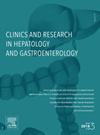Impact of immunotherapy on the care patterns and outcomes of patients with advanced hepatocellular carcinoma
IF 2.6
4区 医学
Q2 GASTROENTEROLOGY & HEPATOLOGY
Clinics and research in hepatology and gastroenterology
Pub Date : 2025-01-25
DOI:10.1016/j.clinre.2025.102542
引用次数: 0
Abstract
Background
Modern immunotherapy with checkpoint inhibitors revolutionized cancer treatment and outcomes. This study aims to demonstrate how immunotherapy has impacted the national landscape of systemic treatment and palliative care in advanced hepatocellular carcinoma (HCC).
Methods
Retrospective cohort selecting patients from the U.S.-based National Cancer Database (NCDB) with clinical stages T3b/T4 and stage IV HCC from 2010 to 2021. We performed a multivariable analysis using the Cox proportional hazard for overall survival (OS) comparisons and a logistic regression model to study immunotherapy use.
Results
Immunotherapy use increased from 0.27 % in 2010 to 33.80 % in 2021. The median OS survival (in months) was 2 for untreated patients, 7.20 for chemotherapy, and 7.46 for immunotherapy. There was a better OS with immunotherapy (HR 0.59, 95 % CI 0.56–0.62). Systemic therapy for palliation increased from 14.41 % in 2010 to 25.32 % in 2021. Compared to surgical palliation, radiation (HR 0.61, 95 % CI 0.52–0.71) and systemic palliative (HR 0.59, 95 % CI 0.51–0.69) therapies improved OS.
Conclusion
From 2010 to 2021, there was a significant increase in the use of immunotherapy, parallel to a large shift toward systemic therapy use for palliative care in patients with advanced HCC. Immunotherapy was associated with a significant OS benefit in the palliative setting.
免疫疗法对晚期肝细胞癌患者护理模式和疗效的影响
背景:检查点抑制剂的现代免疫疗法彻底改变了癌症的治疗和结果。本研究旨在展示免疫疗法如何影响晚期肝细胞癌(HCC)的全身治疗和姑息治疗的国家景观。方法:从美国国家癌症数据库(NCDB)中选择2010年至2021年临床分期为T3b/T4和IV期HCC的患者进行回顾性队列研究。我们使用Cox总生存(OS)比例风险比较和逻辑回归模型进行了多变量分析,以研究免疫疗法的使用。结果:免疫治疗使用率由2010年的0.27%上升至2021年的33.80%。未治疗患者的中位OS生存期(以月为单位)为2个月,化疗患者为7.20个月,免疫治疗患者为7.46个月。免疫治疗有更好的OS (HR 0.59, 95% CI 0.56-0.62)。缓解的全身治疗从2010年的14.41%增加到2021年的25.32%。与外科姑息治疗相比,放疗(HR 0.61, 95% CI 0.52-0.71)和全身姑息治疗(HR 0.59, 95% CI 0.51-0.69)改善了OS。结论:从2010年到2021年,免疫治疗的使用显著增加,与晚期HCC患者使用全身治疗进行姑息治疗的大转变平行。在姑息治疗中,免疫治疗与显著的OS获益相关。
本文章由计算机程序翻译,如有差异,请以英文原文为准。
求助全文
约1分钟内获得全文
求助全文
来源期刊

Clinics and research in hepatology and gastroenterology
GASTROENTEROLOGY & HEPATOLOGY-
CiteScore
4.30
自引率
3.70%
发文量
198
审稿时长
42 days
期刊介绍:
Clinics and Research in Hepatology and Gastroenterology publishes high-quality original research papers in the field of hepatology and gastroenterology. The editors put the accent on rapid communication of new research and clinical developments and so called "hot topic" issues. Following a clear Editorial line, besides original articles and case reports, each issue features editorials, commentaries and reviews. The journal encourages research and discussion between all those involved in the specialty on an international level. All articles are peer reviewed by international experts, the articles in press are online and indexed in the international databases (Current Contents, Pubmed, Scopus, Science Direct).
Clinics and Research in Hepatology and Gastroenterology is a subscription journal (with optional open access), which allows you to publish your research without any cost to you (unless you proactively chose the open access option). Your article will be available to all researchers around the globe whose institution has a subscription to the journal.
 求助内容:
求助内容: 应助结果提醒方式:
应助结果提醒方式:


